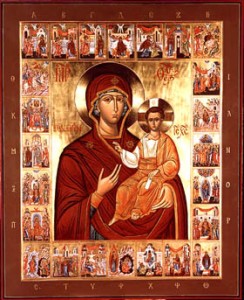The Role of the Theotokos in the Orthodox Church
Midwest Region Spring Delegates Meeting - Spring Valley, IL
April1998 Bishop
Demetri M. Khoury
 My task this evening is to address the topic of the Role of the Theotokos in the Orthodox Church. This is not easy, especially in so short a time. We have two thousand years of Church History and two thousand years of the Theotokos’ involvement in that Church History. I certainly am not going to say it all in a few minutes.
My task this evening is to address the topic of the Role of the Theotokos in the Orthodox Church. This is not easy, especially in so short a time. We have two thousand years of Church History and two thousand years of the Theotokos’ involvement in that Church History. I certainly am not going to say it all in a few minutes.
Great Lent brings a major change in our lives. First of all we should be fasting. Christ made it quite clear that we should befasting when He instructed the disciples “when ye fast, be not, as the hypocrites, of a sad countenance: for they disfigure their faces, that they may be seen of men to fast. Verily I say unto you, They have received their reward. Thou, when thou fastest, anoint thy head, and wash thy face; that thou be not seen of men to fast, but of thy Father who is in secret: and thy Father, who seeth in secret, shall recompense thee.”
In addition we are expected to increase our alms-giving, because of the decrease in spending on foods and luxuries. Thus we bring our passions under control through our fasting and we help those who may not have even the barest minimum of food.
There is also a major change in the way we worship and pray. We celebrate the Divine Liturgy of St. Basil the Great on Sundays instead of the Divine Liturgy of St. John Chrysostom. We have the Liturgy of the Presanctified Gifts on Wednesdays and Fridays, and Great Compline on Mondays, Tuesdays and Thursdays. All these services take on a penitential character which is especially reflected in the use of
